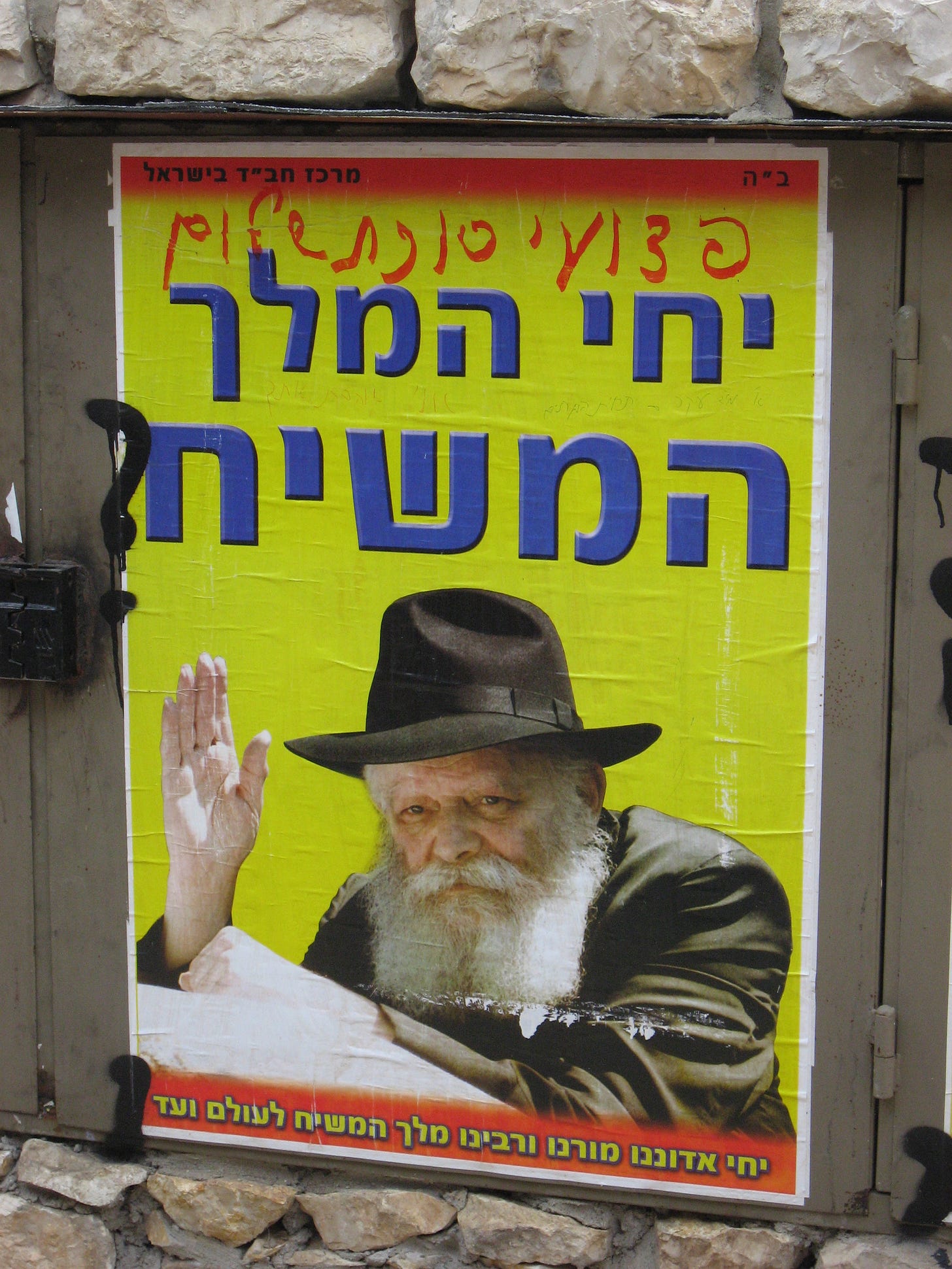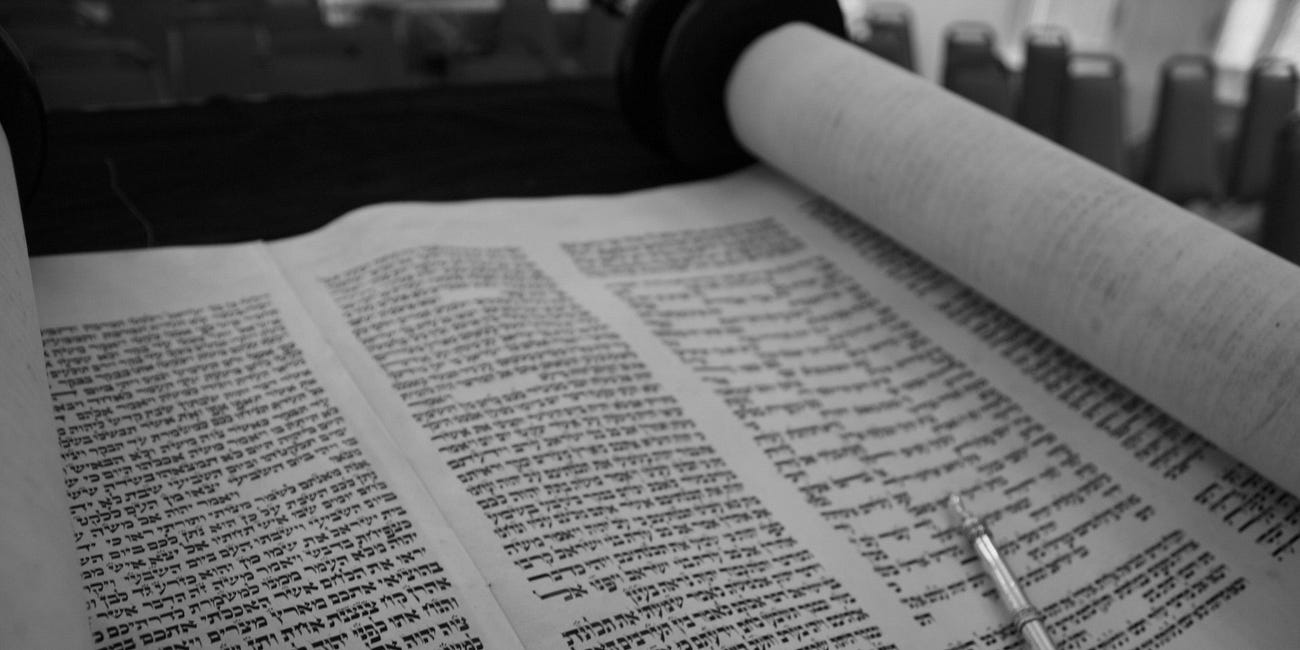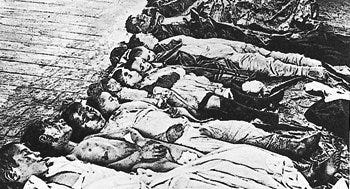This is a weekly series I have, you can find previous Torah studies here. Happy Easter, also, I guess.
1. What Is All This?
Passover is ongoing this week, so we went back and read Parshat Beshalach again. Coincidentally, that was also the first parsha I wrote a commentary for—so just go back and read that one:
Torah Study 1
I’m beginning to go to synagogue regularly as my sister’s Bat Mitzvah approaches. So I’m regularly reading Torah and hearing commentary, and I think it might be fun to deal out some of my own. This is part 1 of potentially many.
In any case, the Haftarah this week is new. We’re reading Chapter 22 of the Second Book of Samuel, a poem of praise for God, sung by King David after his victory over Israel’s enemies.
While it isn’t as explicitly prophetic as some other Biblical texts, Christians have a tendency to co-opt any old Davidic passage as evidence for Jesus’ divinity, so I think it’s fair game. For instance, Psalms 22 is often cited as a prophecy fulfilled by Jesus’ crucifixion—David sings:
Dogs surround me;
a pack of evil ones closes in on me,
like lions [they maul]1 my hands and feet.I take the count of all my bones
while they look on and gloat.They divide my clothes among themselves,
casting lots for my garments.
Sure, I guess some of that vaguely fits the crucifixion story. But, as
recently put it, “the Bible is a big book … It’s not at all surprising that if you search through [it], you’d find some things that sound like they’re about Jesus.” I’m unimpressed.Given that II Samuel 22 appears again as Psalms 18—in the same context and only a few dozen verses prior to Psalms 22—it’s just as plausibly a messianic prophecy. And I think the chapter does a pretty good job of describing the messiah! That is, if you suspect the messiah might be Rabbi Menachem Mendel Schneerson.
2. Schneerson Was Delivered; Jesus Was Left to Die
O LORD, my crag, my fastness, my deliverer!
O God, the rock wherein I take shelter:
My shield, my mighty champion, my fortress and refuge!
My savior, You who rescue me from violence!All praise! I called on the LORD,
And I was delivered from my enemies.
Jesus was, very famously, not delivered from his enemies! For years, he went all around Israel, becoming very popular, making lots of friends and few dangerous enemies. Then the first time he had someone powerful come after him, he failed extremely hard and got completely owned.
Schneerson, on the other hand, faced deadly enemies all through his early life and was delivered from each one.
His father became the chief rabbi of Yekaterinoslav, in modern-day Ukraine, in 1907. Just two years before, Yekaterinoslav had been the site of one of the most horrific pogroms in Russian history.
During the Russian Revolution, while Schneerson was busy memorizing the Talmud and its commentaries, the White Army swept through Yekaterinoslav and raped nearly a thousand women. Shortly thereafter, Ukrainian independence fighters came through for their turn, slaughtering 150 Jews.2
Schneerson, delivered through all that strife, went off in 1923 to Warsaw, devoting himself to Torah study under the Chabad-Lubavitch Rebbe Yosef Yitzchak Schneersohn.3
He stayed in Warsaw until 1928 when he and his wife, Yosef Yitzchak’s daughter Chaya Mushka, moved to Berlin. Of course, the Nazis took over in 1933, and so they quickly fled to Paris. Which wasn’t so safe either! Only three days before the Nazis marched into the city in May 1940, the Schneersons escaped south to Vichy. They wouldn’t emigrate to the US until 1941.
Jesus was well-loved before he succumbed to the first government that tried to kill him.
Menachem Mendel Schneerson survived state-sanctioned pogroms in Yekaterinoslav, the Nazi takeover in Berlin, the Western Campaign in Paris, and the Nazi-collaborating regime in Vichy.
Which messiah was more “rescued from violence,” more “delivered from [his] enemies?”
3. Schneerson Won the War; Jesus Never Fought Nobody
Then the earth rocked and quaked,
The foundations of heaven shook—
Rocked by His indignation.Smoke went up from His nostrils,
From His mouth came devouring fire;
Live coals blazed forth from Him.He bent the sky and came down,
Thick cloud beneath His feet.He mounted a cherub and flew;
He was seen on the wings of the wind.He made pavilions of darkness about Him,
Dripping clouds, huge thunderheads;In the brilliance before Him
Blazed fiery coals.
Schneerson became an American citizen. He’d trained briefly as an electrical engineer in Paris, and so he joined the American war effort, helping to design the battleship which would be the site of the Japanese surrender, and engaging in other classified work.
The war, of course, was ultimately won with hellfire and earth-rocking munitions. Schneerson’s enemies—the Germans first, then the Japanese—were overwhelmed by the “devouring fire” and “live coals” unleashed by the “wings of the wind”—the US Army Air Forces.
“Pavilions of darkness” rose over Hiroshima and Nagasaki, nuclear blasts brilliantly blazing and toxic mushroom clouds dripping radiation over the home islands.
Did Jesus ever have any nukes?
He rescued me from my enemy so strong,
From foes too mighty for me.They attacked me on my day of calamity,
But the LORD was my stay.He brought me out to freedom,
He rescued me because He was pleased with me.The LORD rewarded me according to my merit,
He requited the cleanness of my hands.For I have kept the ways of the LORD
And have not been guilty before my God;I am mindful of all His rules
And have not departed from His laws.
Schneerson remained a committed and devout rabbi throughout the war. God rescued him from his enemies and brought him to the Land of the Free—presumably because He was so pleased with Schneerson’s meritorious scholarship and devotion.
4. Schneerson Became a Great and Respected Leader of Men; Jesus Ran Away to Heaven (Like a Little Bitch)
You have rescued me from the strife of peoples,
Kept me to be a ruler of nations;
Peoples I knew not must serve me.Aliens have cringed before me,
Paid me homage at the mere report of me.Aliens have lost courage
And come trembling out of their fastnesses.The LORD lives! Blessed is my rock!
Exalted be God, the rock
Who gives me victory;The God who has vindicated me
And made peoples subject to me,
While neither Jesus nor Schneerson ever became a true “ruler of nations,” while neither actually had “peoples subject” to them, I think Schneerson got a lot closer.
Every single American president since Richard Nixon has honored Schneerson’s charitability, decency, and wisdom. In 1960, Schneerson even turned down a meeting with soon-to-be President John F. Kennedy because he was too busy seeing the common men and women who had scheduled appointments with him in advance.
Schneerson was a trusted moral figure not just to Jews, but also to “peoples [he] knew not” and “aliens.” He took seriously the doctrine to be a “light unto the nations,” and regularly preached the Noahide laws to the American public on television. He was an advocate of universal human rights, solar energy, nuclear disarmament, and foreign aid.
Meanwhile, Jesus could do little more than complain about greedy Jews.
For this I sing Your praise among the nations
And hymn Your name:Tower of victory to His king,
Who deals graciously with His anointed,
With David and his offspring evermore.
Menachem Mendel Schneerson worked 18-hour days for decades. When he was 75 years old, he had a heart attack—but immediately made a complete recovery, and continued working 18-hour days. 75-year-old men don’t often recover from heart attacks and then go on working ridiculously hard! How graciously God must have been dealing with Schneerson…
Still, the Rebbe was an old man. At the age of 90, he suffered a stroke which rendered him mute and half-paralyzed. It occurred while he was engaged in a deeply spiritual prayer at the grave of his father-in-law.
After the stroke, rumors that Schneerson might be “His anointed”—hamoshiach, the messiah—began to intensify. But in 1994, God’s grace ran out, and Schneerson finally passed. He was buried next to his father-in-law in Queens—the site has since become a destination for Jewish pilgrims, an American Western Wall.
Jesus might have the upper hand when it comes to God’s grace. His death only lasted for three days, before he was given the ultimate grace, risen from the dead. Schneerson, on the other hand, has been lying dead for a full 30 years.
Of course, the story of Jesus’ resurrection may be entirely apocryphal. And certainly, if the Rebbe did wake up, it would undeniably be way more epic than Jesus’ measly three-day nap. God understands dramatic suspense!
5. Fine, the Lubavitcher Rebbe is Obviously Not the Messiah
While many Chabadniks still hold Schneerson in high esteem—and a few do still believe him to be the messiah; they’re eagerly awaiting his return—the official Chabad line is decidedly anti-messianic.

But if it’s obvious to you (and it should be) that Schneerson isn’t the messiah, I think it should be similarly obvious that Jesus wasn’t either. The Lubavitcher Rebbe fulfilled scripture as much, or even more than Jesus did. The Rebbe was a respected moral and spiritual leader, even among non-Jews, in a way Jesus never became during his lifetime. Most importantly, the Rebbe had actually good and non-insane ideas about what was good to do: he supported charitable giving and foreign aid, and fought against existential risk.
Given two options for who the savior of mankind might be: one who walked on water but also advocated eternal torment for anyone who was rich; or another who never did any magic tricks, but encouraged his followers to support human rights, help the less fortunate, and avoid nuclear holocaust—my money would be on the latter!
The Lubavitcher Rebbe was simply a better messiah than Jesus.
Christians like to translate this bit with “they pierce” to better fit the crucifixion story, but there’s absolutely no reason to do this. The Hebrew doesn’t even include a verb—it simply reads “כָּ֝אֲרִ֗י יָדַ֥י וְרַגְלָֽי,” or “like a lion my hand and foot.” My sense is that lions maul more than they pierce, so I prefer Rashi’s translation to King James’.
The two were distantly related cousins. Menachem Mendel would marry Yosef Yitzchak’s daughter which, ew, but they never had any kids, so whatever.







Yeah, if you don't believe in the resurrection, the story of Jesus is not compelling compared with many of the Biblical prophets and patriarchs, especially David.